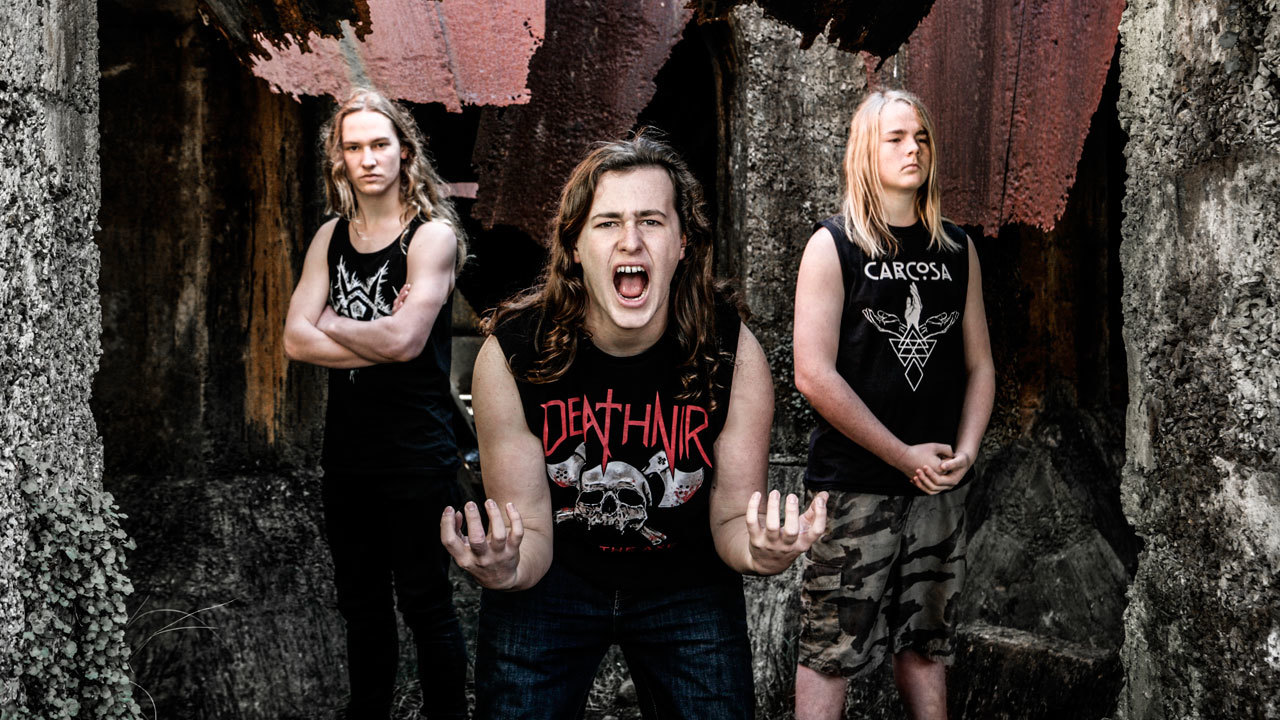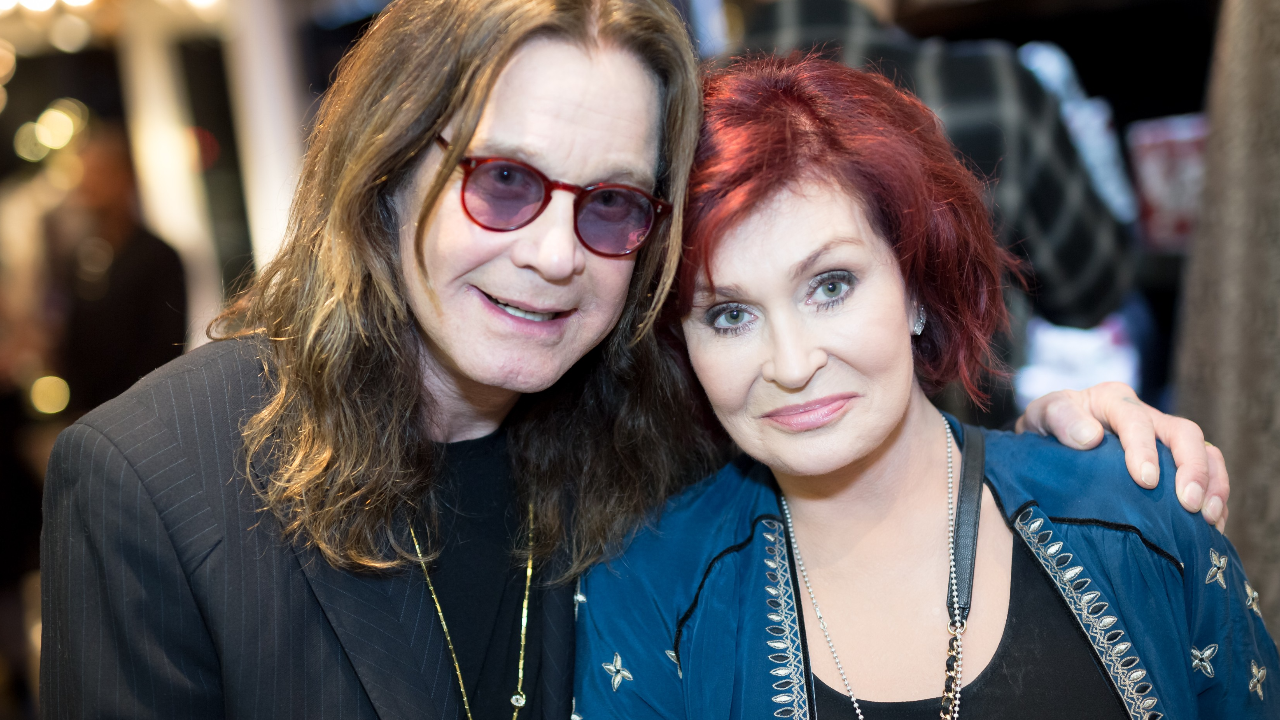Alien Weaponry: Where Māori meets metal
Alien Weaponry are three teenagers of Māori decent whose recent single Rū Ana Te Whenua is making a big noise in New Zealand. Here's their story...

“Māori haka is a lot like metal,” says Alien Weaponry drummer Henry de Jong. “In fact, more so than reggae or hip-hop, which are often the ‘go-to’ genres for Māori music here in New Zealand. Metal and Māori just works. It kicks ass!”
Listen to Alien Weaponry’s Rū Ana Te Whenua and you’ll get an idea of exactly how well it works, and how much ass it kicks. Starting with a chilling warrior cry, it’s an absolutely ferocious, five-and-a-half minute blast of thrash that tells the story of de Jong’s great great great grandfather, Te Ahoaho, a war chief who fought and died at the battle of Pukehinahina in 1864. The battle, during which British forces in New Zealand suffered a humiliating defeat, was part of the Tauranga campaign, a six-month-long armed conflict fought over issues of land ownership.
“Two hundred and thirty Māori dug themselves into the hilltop at Pukehinahina and withstood the heaviest artillery bombardment the British had ever delivered,” explains Henry. “The British had brought with them new state of the art Armstrong canons, and pounded the Māori positions for a full day and a half.
“Thinking they had killed everyone inside, the 1700-strong British contingent stormed the Pa (Maori defences) to find it empty. Thinking the Māori garrison had fled, they sent a dispatch rider back to tell the commanders they had taken the Pa. Then, without warning, Maori warriors sprung from hidden underground bunkers and decimated the British ranks. If you listen to the song you can hear how the battle progressed. This demoralising defeat was the beginning of the end, and ultimately lead to the withdrawal of British military presence in New Zealand.”
If the stunning mix of of Te Reo Maori vocals and thrash metal wasn’t enough, there’s the band’s ages: drummer Henry is just 18, while younger brother Lewis de Jong (vocals/guitar) and bassist Ethan Trembath are bother just 16
If the stunning mix of of Te Reo Maori vocals and thrash metal wasn’t enough, there’s the band’s ages: drummer Henry is just 18, while younger brother Lewis de Jong (vocals/guitar) and bassist Ethan Trembath are bother just 16.
Despite their tender ages, Alien Weaponry already have the best part of a decade’s experience behind them, forming in 2010, when the younger de Jong was just eight years old. And they’ve had some success, too, receiving a $10,000 grant in 2015 from NZ On Air to help with recording, and collecting another $33,000 last year at two different music contests. “We have never really thought we were doing anything that different,” says Henry. “We’re not very interested in fashion, so the whole metalcore djent thing really passed us by. We’re young, we’re Māori, and we live in the countryside and play in a thrash metal band, if that makes us different then what the hell, we are good with that.”
Sign up below to get the latest from Metal Hammer, plus exclusive special offers, direct to your inbox!
The success has continued with Rū Ana Te Whenua, which made it to the top of Spotify’s viral chart in New Zealand, holding off competition from pop superstars like Calvin Harris and Coldplay. “We didn’t really expect it,” says Henry. “Lewis was at a music industry thing and this guy comes up to him and says ‘congratulations, you’re number two on the Spotify NZ Viral 50’, and he was like ‘what, wait are you kidding!!?’, and next day we were number one.
“Metal never gets on the charts here in NZ let alone metal in Māori. We haven’t really paid all that much attention to the music charts before, I suppose we have always just done our own thing. People have been comparing us to Sepultura over the last couple of weeks, and the funny thing is we’ve never really listened to them. We are checking them out now!”
Why’s it important to write in te reo Māori?
“We started writing in te reo Māori because some friends in a ska band called Strangely Arousing had entered the Pacifica Beats competition and we thought, if they can do it why not a metal band? We didn’t think we would get anywhere but ended up winning it.
“Lewis and I used to go to a full immersion Kura Kaupapa Māori (Māori school) so writing in Maori was not that hard for us. Māori is a very poetic language, lots of double meanings, great for songwriting.”
What’s the reaction been to the song from within the Māori community?
“We were a little uncertain how it would be taken by people. We tackle some pretty meaty subjects too, but the response from almost everyone has been overwhelmingly supportive, especially from Māori. Lewis and I are pale-skinned dudes and like many Māori here are the product of multicultural mixing. Māori and European married pretty early on here in New Zealand. We have had a lot of Māori coming ‘out of the closet’ as it were and confessing to being metal fans and a lot of waka blonds (Pale Māori) saying our songs helped them feel proud and connected. That’s a pretty awesome and humbling feeling.”
You’ve made a choice to be political with your music. Why?
“I suppose we grew up in a political household. One of our earliest memories is being on the Foreshore and Seabed Hīkoi (protest march) to parliament to protest the legislative theft of Māori customary guardianship of the New Zealand coastline. Our home was also filled with music by bands like Rage Against The Machine and Public Enemy, with songs and social commentary that challenged us to think. Also being at a Kura Kaupapa Māori helps you have your eyes open to the struggles and adversity that a colonised people can faced. I think most Māori are by nature political.”
Who are your influences?
“Lamb of God has always been a biggie for Lewis. We saw them live a couple of years back in New Zealand. They were awesome. He’s also into Killswitch Engage and Australian band Twelve Foot Ninja. He has been listening to a bunch of rap lately too: Eminem, J Cole etc. He listened to nothing but System Of A Down for a couple of months straight a while back. He wanted to be Stevie Ray Vaughn when he was a kid and we all listened to a shit load of Metallica when we were younger.
“Ethan likes Trivium and Rammstein and has been listening to a lot of Animals As Leaders lately, that might just be a bass player thing. I really like Gojira and have been into NZ bands like Subtract and Cripple Mr Onion. But that’s probably a drummer thing. We found Wolfheart on YouTube when we were shooting our music videos, they are kind of an indigenous band like us but from the flipside of the world. It’s kind of cool.”
What other young bands from New Zealand should we be looking out for?
“We are currently on tour and have been playing with some awesome New Zealand bands. Seas Of Conflict are one to watch. Blue Ruin, instrumental band Average Mars Experience from Auckland and Empire from Christchurch. We toured with Devilskin a couple of years back and played some awesome shows with Bulletbelt. We very much enjoy gigging with bands like Deathnir and Auckland band (IN)Human.”

Online Editor at Louder/Classic Rock magazine since 2014. 40 years in music industry, online for 27. Also bylines for: Metal Hammer, Prog Magazine, The Word Magazine, The Guardian, The New Statesman, Saga, Music365. Former Head of Music at Xfm Radio, A&R at Fiction Records, early blogger, ex-roadie, published author. Once appeared in a Cure video dressed as a cowboy, and thinks any situation can be improved by the introduction of cats. Favourite Serbian trumpeter: Dejan Petrović.
